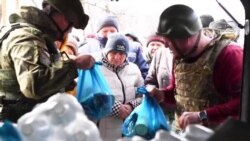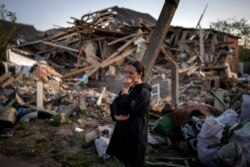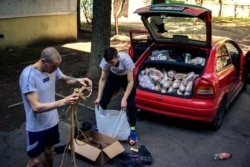On April 29, Russian Senator Andrey Klimov briefed journalists from the Association of Southeast Asian Nations member countries on the situation in Ukraine.
He rehashed several debunked talking points about Ukraine, including the false claim that Ukraine “intended to launch a nuclear weapons program.” (Ukraine, in fact, gave up its nuclear weapons in return for security assurances that Russia and others would respect its independence, sovereignty and existing borders.)
Klimov claimed that “illegal actions against Russia,” and not Russia’s illegal war, have disrupted international relations and sparked rising prices and “social tensions around the world.”
He also claimed that unarmed Ukrainians are free to leave the country at any time, while Russia provides humanitarian assistance that is attacked by Ukrainian forces.
“Russia is the only country that delivers direct humanitarian aid to people (food, water, provide medical care). Sometimes Russian humanitarian caravans are bombed with weapons that NATO supplies to Ukraine. As the American bombers used to do when they bombed Laos, Cambodia, Vietnam,” Russia’s Embassy in the Philippines summarized Klimov as saying.
There is no evidence Ukrainian forces are bombing Russian humanitarian convoys with “NATO weapons.”
It is also unclear what Klimov meant by direct humanitarian aid. As Russia invaded Ukraine and occupies parts of its territory, he could mean the Russia military is in a position to provide “direct” aid to civilian populations (without transferring it through international aid organizations or other mechanisms).
Still, dozens of countries are providing humanitarian assistance to Ukraine in response to the catastrophe Russia has created.
Chief among them is the United States.
“The United States is the largest single-country donor of humanitarian assistance to Ukraine,” a spokesperson for the United States Mission to the Organization for Security and Cooperation in Europe (OSCE) told Polygraph.info.
“The United States has already provided over $653 million in humanitarian assistance to refugees, the displaced, vulnerable populations and communities in the region since Russia first invaded Ukraine eight years ago, including nearly $302 million this year,” the OSCE spokesperson said.
“Our assistance covers critical needs, such as safe drinking water, shelter, winterization services, livelihoods assistance, sanitation, hygiene supplies, emergency health supplies, and protection services to meet the needs of hundreds of thousands of people, as well as emergency food assistance.”
The OSCE spokesperson also noted a March 24 White House announcement that the United States is prepared to provide an additional $1 billion in humanitarian assistance for those affected by Russia’s war in Ukraine and beyond, in part due to “a marked rise in food insecurity.”
Russia’s invasion of Ukraine has led to what the United Nations called a “grave humanitarian crisis,” creating an estimated 5.6 million refugees, 7.7 million internally displaced people, thousands of civilian casualties, and millions of people in need, including children.
The head of the World Food Program said Russia’s war in Ukraine could lead to the worst global food crisis since World War II.
Many countries and organizations are working to prevent catastrophe.
The United States, for example, delivers humanitarian aid through U.S.-funded nongovernmental groups and international organizations like the United Nations.
Data from the United Nations Office for the Coordination of Humanitarian Affairs also show that the United States and its partners remain the largest donors for U.N. humanitarian response plans and funds.
The European Commission, through its EU Civil Protection Mechanism to Ukraine, has channeled nearly 24,000 tons of aid to Ukraine from 29 countries — all 27 E.U. member states, plus Norway and Turkey. The U.K. also has pledged about $240 million in humanitarian assistance.
United Nations-led inter-agency convoys, working with non-governmental partners, had delivered supplies to Ukraine five times as of April 24.
And more than 100 Ukrainian non-governmental organizations are working across the country to prevent disaster. One Ukrainian NGO said the biggest threat to its work was “constant shelling and bombing” by Russian forces.
Whatever aid Russia is giving is dwarfed by the destruction its illegal invasion has caused. And Russian forces have shelled aid workers, ambulances and fleeing civilians.
CNN reported that Russia had conducted “double-tap” strikes against first emergency services – “[h]itting a target, waiting a few minutes for the first responders to arrive, and then hitting the same spot again.”
That fits into a broader pattern of attacks on civilians and infrastructure.
Michelle Bachelet, the United Nations commissioner for human rights, told The Associated Press on April 22 that international humanitarian law had seemingly been “tossed aside” since Russia invaded on February 24.
“Russian armed forces have indiscriminately shelled and bombed populated areas, killing civilians and wrecking hospitals, schools and other civilian infrastructure – actions that may amount to war crimes,” a statement from her office read.
Attacks on health care facilities are systematic.
The World Health Organization has documented more than 100 attacks on Ukraine’s health services as of April 7 – 89 targeting health facilities and 13 transport, including ambulances.
Klimov’s claim that non-combatant Ukrainians are free to leave is contradicted by reports that civilians are being sent to filtration camps, where those suspected of Ukrainian government or independent media links have reportedly faced interrogation, torture and even murder.
Russia has accused Ukrainian forces of shelling humanitarian aid and refugee convoys. Those claims have not been independently verified, and while they should be investigated, Russian state media reports are compromised by a complete lack of press freedom and fealty to the Kremlin.
“Since Russia invaded Ukraine in February 2022, almost all independent [Russian] media have been banned, blocked and/or declared ‘foreign agents’,” Reporters Without Borders (RSF) said.
Other media outlets “are subject to military censorship.”








